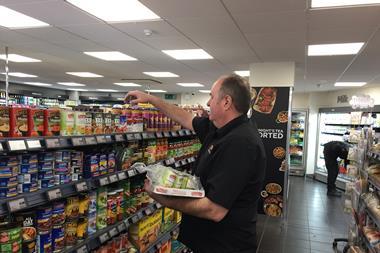A ‘Best of British’ label should mean exactly that, and suppliers should voluntarily make sure it does, says Jim Paice
People like to know where their food comes from. They want clear information to help them make choices and exercise their consumer power to buy veg grown by local farmers, for example, or meat from animals farmed to high welfare standards.
Research by Which? last year asked members of the public what they wanted on food labels. Eighty percent said it was important to have accurate country-of-origin labelling on all meat and poultry, and more than 70% also wanted it for all fish, dairy products, fruit and veg.
At the moment, food labelling is not as clear as it could or should be. Meat and dairy produce from other countries, when processed in this country, can quite legally be labelled as British. So these products can be marketed using 'Best of British' or 'Nation's Favourites' slogans, when the meat used has been imported.
Not giving consumers the full story is denying them the right to make choices on ethical grounds . It is also risking loss of trust. And when consumers lose trust, they take their money elsewhere. Confusing and unclear information is bad for business.
There is already government best-practice guidance, which recommends, for example, that unprocessed meat only be labelled as 'British' if the animal had been born, reared and slaughtered in the UK; and that processed foods such as sausages should only be labelled as 'British' if the meat is also of UK origin. But not enough food businesses are complying with this.
Clearer labelling information is a priority for this government. The coalition programme contains a commitment to seek honesty in food labelling so consumers can be confident about where their food comes from; and this has been further developed in Defra's recently published Structural Reform Plan.
The EU is responsible for food labelling law and is considering new rules on country-of-origin labelling. We would prefer industry to respond voluntarily to consumer demands (although will be continuing talks on the proposed Food Information Regulation in Brussels to maintain the option of legislation). So we are working with industry to improve existing origin labelling.
Some good work is already happening. A best-practice code already exists in the pig meat industry, with many major food companies committed to minimum standards on origin labelling, product definitions (eg free-range) and breed names on labels. And there are some supermarket own brands that show clearly that the meat is British and the product is made in Britain.
But this kind of good practice needs to be the norm. I've now begun formal engagement with the FDF, BRC, the Business Services Association and British Hospitality Association and several other food trade organisations on an industry-owned voluntary approach to country-of-origin labelling. I've also written to food industry leaders asking for their co-operation and support in achieving clarity and transparency for the consumers who want to make a choice based on the origin of their food.
And I will use our regular meetings with the big retailers to discuss the proposals. My aim is for industry-owned, voluntary, honest labelling codes by the end of this year, and a public commitment by food businesses to sign up to them.
Jim Paice is minister of state for agriculture and food.
People like to know where their food comes from. They want clear information to help them make choices and exercise their consumer power to buy veg grown by local farmers, for example, or meat from animals farmed to high welfare standards.
Research by Which? last year asked members of the public what they wanted on food labels. Eighty percent said it was important to have accurate country-of-origin labelling on all meat and poultry, and more than 70% also wanted it for all fish, dairy products, fruit and veg.
At the moment, food labelling is not as clear as it could or should be. Meat and dairy produce from other countries, when processed in this country, can quite legally be labelled as British. So these products can be marketed using 'Best of British' or 'Nation's Favourites' slogans, when the meat used has been imported.
Not giving consumers the full story is denying them the right to make choices on ethical grounds . It is also risking loss of trust. And when consumers lose trust, they take their money elsewhere. Confusing and unclear information is bad for business.
There is already government best-practice guidance, which recommends, for example, that unprocessed meat only be labelled as 'British' if the animal had been born, reared and slaughtered in the UK; and that processed foods such as sausages should only be labelled as 'British' if the meat is also of UK origin. But not enough food businesses are complying with this.
Clearer labelling information is a priority for this government. The coalition programme contains a commitment to seek honesty in food labelling so consumers can be confident about where their food comes from; and this has been further developed in Defra's recently published Structural Reform Plan.
The EU is responsible for food labelling law and is considering new rules on country-of-origin labelling. We would prefer industry to respond voluntarily to consumer demands (although will be continuing talks on the proposed Food Information Regulation in Brussels to maintain the option of legislation). So we are working with industry to improve existing origin labelling.
Some good work is already happening. A best-practice code already exists in the pig meat industry, with many major food companies committed to minimum standards on origin labelling, product definitions (eg free-range) and breed names on labels. And there are some supermarket own brands that show clearly that the meat is British and the product is made in Britain.
But this kind of good practice needs to be the norm. I've now begun formal engagement with the FDF, BRC, the Business Services Association and British Hospitality Association and several other food trade organisations on an industry-owned voluntary approach to country-of-origin labelling. I've also written to food industry leaders asking for their co-operation and support in achieving clarity and transparency for the consumers who want to make a choice based on the origin of their food.
And I will use our regular meetings with the big retailers to discuss the proposals. My aim is for industry-owned, voluntary, honest labelling codes by the end of this year, and a public commitment by food businesses to sign up to them.
Jim Paice is minister of state for agriculture and food.













No comments yet